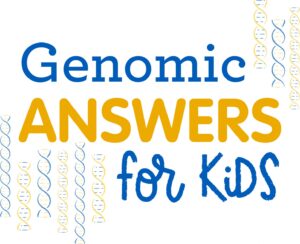 Kids have lots of questions. But even the world’s top scientists don’t have all the answers — especially when it comes to rare genetic disorders afflicting children.
Kids have lots of questions. But even the world’s top scientists don’t have all the answers — especially when it comes to rare genetic disorders afflicting children.
Our HiFi reads, highly accurate long reads, generated by our Sequel II and new Sequel IIe Systems, are helping researchers uncover disease-causing genetic variants that had previously gone undetected by other technology, contributing to increased solve rates for rare diseases.
We’re particularly excited to see this technology applied to translational research in children. We will be collaborating with Children’s Mercy Kansas City as part of its Genomic Answers for Kids (GA4K) program, which aims to collect genomic data and health information for 30,000 children and their families over the next seven years, ultimately creating a database of nearly 100,000 genomes.
“We are delighted to be collaborating with the innovative scientists at PacBio as we bring their long-read sequencing data to bear on some of our most difficult cases of rare pediatric disease to give patients and families the answers they deserve,” said Tomi Pastinen, director of the Center for Pediatric Genomic Medicine at Children’s Mercy.
It is estimated that as many as 25 million Americans — approximately 1 in 13 people — are affected by a rare condition. Whole-genome and whole-exome sequencing is often employed to try to diagnose these conditions, but often this involves short-read sequencing, and causes are found in only ~25% to 50% of cases — leaving the majority of cases unsolved.
Hoping to overcome these odds, Children’s Mercy has recently invested in Sequel II Systems, with plans to use our Single Molecule, Real-Time (SMRT) Sequencing technology to generate HiFi reads to detect what the short-read methods might have missed. Early results are encouraging, and have already demonstrated increases in pathogenic variant and disease-gene discovery beyond what was possible with short-read methods.
The researchers will also be working with the Microsoft Genomics team to build Microsoft Azure cloud-based analysis solutions and a data repository for this unique dataset.
“The diagnosis journey for a child with a rare disease and their families can be long and often inconclusive. We believe the advancement of precision medicine with specialized technologies will be key to gaining a better understanding and early diagnosis of these debilitating and deadly diseases,” said Gregory Moore, corporate vice president, Microsoft Health.
We look forward to making a meaningful impact by increasing solve rates through this important partnership.
More information about how Children’s Mercy scientists are using HiFi sequencing will be presented in PacBio’s ancillary workshop Monday, October 26 from 1:00-2:00 pm ET during the American Society of Human Genetics (ASHG) Annual Meeting. Emily Farrow, Director of Laboratory Operations at the Genomic Medicine Center at Children’s Mercy, will give a talk entitled “Applications of Third Generation Sequencing in Unsolved Disease.” Free virtual event registration is available here.
See additional examples of the use of SMRT Sequencing in rare disease research and learn more about structural variant detection:
- Webinar: Increasing Solve Rates for Rare and Mendelian Diseases with Long-Read Sequencing
- The Pathologist: Solving Rare Disease with SMRT Sequencing
- A Rare Opportunity to Help Tackle Daughter’s Rare Disease
- Review: Long-Read Sequencing Helps Uncover Genetic Basis for Rare Disease
- SOLVE-RD Team Adopts PacBio Sequel II System to Solve Rare Diseases
- In Alabama, Scientists Use HiFi Data to Solve Rare Neurodevelopmental Disorders